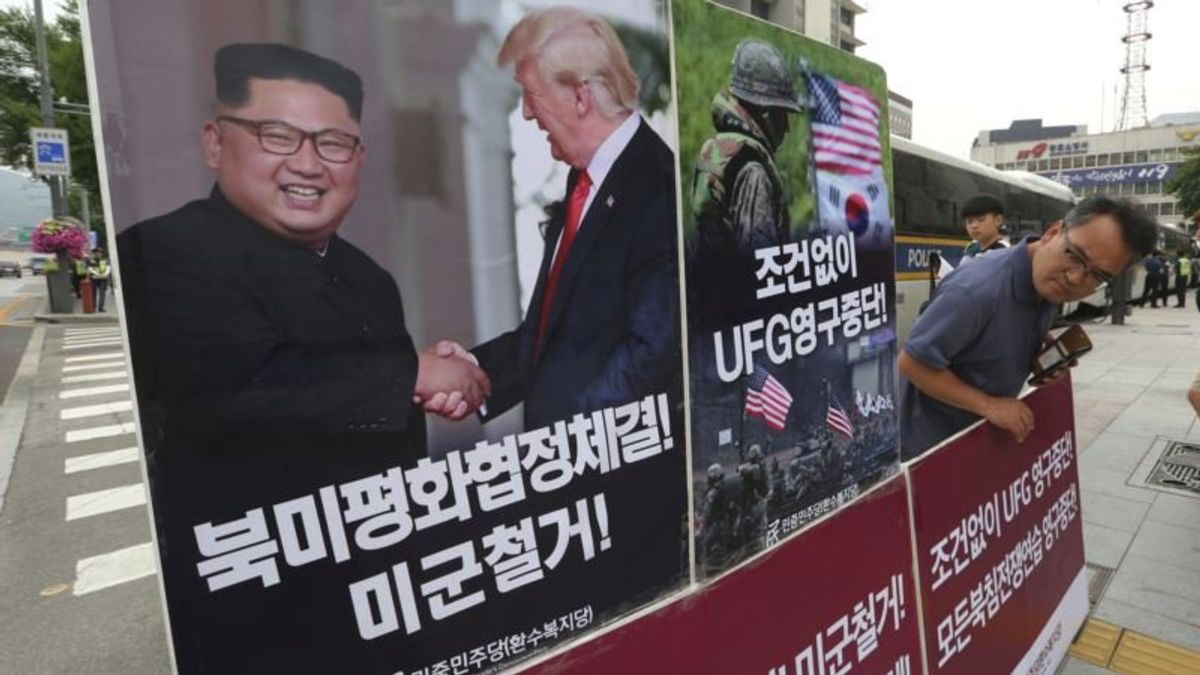
Analysts Look Ahead at Uncertain North Korean Talks
Analysts Look Ahead at Uncertain North Korean Talks

SEOUL, SOUTH KOREA —
North Korea announced last week it would not pursue denuclearization unless the United States removes what it calls its “nuclear threat.”
The Institute for North Korean Studies’ Yongwook Ryu was not surprised by North Korea’s declaration.
“Most people suspected that North Korea and the United States, also including South Korea, has a different understanding of denuclearization,” he said. “Analysts and pundits knew that by denuclearization, North Korea meant the removal of U.S. forces from the Korean Peninsula, as well as U.S. nuclear threat.”
SEE ALSO:
N. Korea: No Denuclearization Until US Removes Nuclear Threat
However, the Asan Institute’s Seong Whun Cheon goes further, saying, “North Korea hijacked the terminology denuclearization from South Korea and the United States.
“Denuclearization was coined by Washington,” Cheon said, referring to a process whereby “South Korea and North Korea give up all forms of nuclear position, including uranium enrichment and reprocessing facilities that can be devoted to military purposes.”
Cheon said that was the ultimate goal of the 1991 joint North and South Korean declaration, but Pyongyang ignored the statement and continued to develop its programs, all the while telling Seoul and Washington they were abandoning them.

Timing of North Korea’s statement
North Korea’s statement defining “denuclearization” came as Pyongyang and Washington are trying to negotiate a second summit between its two heads of state, North Korean leader Kim Jong Un and U.S. President Donald Trump.
But in its statement Pyongyang said, “The United States must now recognize the accurate meaning of the denuclearization of the Korean Peninsula, and especially, must study geography.
“When we talk about the Korean Peninsula, it includes the territory of our republic and also the entire region of (South Korea) where the United States has placed its invasive force, including nuclear weapons. When we talk about the complete denuclearization of the Korean Peninsula, it means the removal of all sources of nuclear threat, not only from the South and North but also from areas neighboring the Korean Peninsula,” the statement read.
Ryu indicates that North Korea may be signaling that it is not interested in initiating dialogue with the United States at this time.
“This does not necessarily mean they do not want to have talks with [the United States], but it’s telling the American side that it’s not intending to begin negotiations at this moment in time,” he said, noting Washington should respond to the statement in some way.
“The most recent statement from North Korea is just a repetition of their view,” Cheon said. “The problem is we have ignored, or we simply were fooled by North Korea’s propaganda.”
He says the timing of the statement may be in response to the Trump administration’s pressure on Pyongyang to implement the terms of the Singapore Summit, as the United States interpreted them.

Prospects for a second Trump-Kim summit
“We still are working through the execution of Chairman Kim’s commitment to denuclearize,” U.S. Secretary of State Mike Pompeo told Kansas-based KNSS Radio last week. The U.S., he added, is “hopeful that in the new year President Trump and Chairman Kim will get together not too long after the first of the year and make even further progress on taking this threat to the United States away from us.”
Cheon is slightly less optimistic than Pompeo, predicting the likelihood of a second summit at 50 percent and the deciding factor is what President Trump’s position will be on North Korea, “in the wake of General Mattis’ departure from the Defense Department.”
“I think the swing of America’s North Korea policy is so wide,” he said, that engagement policies could hit two extremes.
“On one hand, President Trump may compromise with North Korea [and] be satisfied with eliminating North Korea’s ICBMs and [some of their] nuclear warheads,” but Cheon said that if the president believes he was “fooled by North Korea … he may take more radical, hotter and aggressive action toward North Korea.”
While the United States has been discussing the timing of a second summit early in 2019, Ryu says that while such a meeting may still happen, it may happen later than that.
In Kim Jong Un’s forthcoming New Year’s Day address, Ryu said there is a possibility that the North Korean leader “will not emphasize North Korea being a nuclear sate as a gesture to the USA and South Korea [and] that it is still interested in holding talks and advancing negotiations with the hope of removing sanctions on Pyongyang.”
Meanwhile, Seoul has unveiled its national defense strategy that continues to pursue peace on the peninsula in the wake of stalled talks and an uncertain future.
Lee Ju-hyun contributed to this report.
 Partial US Government Shutdown Unlikely to End ThursdayNext PostTrump Returns After Visiting Troops in Iraq
Partial US Government Shutdown Unlikely to End ThursdayNext PostTrump Returns After Visiting Troops in Iraq






